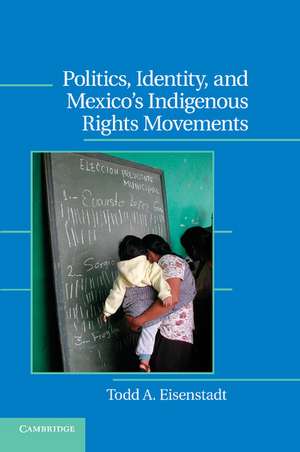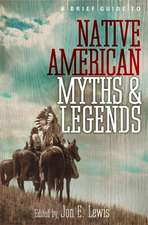Politics, Identity, and Mexico’s Indigenous Rights Movements: Cambridge Studies in Contentious Politics
Autor Todd A. Eisenstadten Limba Engleză Paperback – 21 aug 2013
| Toate formatele și edițiile | Preț | Express |
|---|---|---|
| Paperback (1) | 282.87 lei 6-8 săpt. | |
| Cambridge University Press – 21 aug 2013 | 282.87 lei 6-8 săpt. | |
| Hardback (1) | 459.73 lei 6-8 săpt. | |
| Cambridge University Press – 20 mar 2011 | 459.73 lei 6-8 săpt. |
Din seria Cambridge Studies in Contentious Politics
-
 Preț: 178.72 lei
Preț: 178.72 lei -
 Preț: 199.90 lei
Preț: 199.90 lei -
 Preț: 220.86 lei
Preț: 220.86 lei - 9%
 Preț: 626.76 lei
Preț: 626.76 lei -
 Preț: 210.37 lei
Preț: 210.37 lei -
 Preț: 251.27 lei
Preț: 251.27 lei -
 Preț: 197.42 lei
Preț: 197.42 lei -
 Preț: 232.48 lei
Preț: 232.48 lei -
 Preț: 289.11 lei
Preț: 289.11 lei -
 Preț: 238.15 lei
Preț: 238.15 lei - 8%
 Preț: 564.61 lei
Preț: 564.61 lei -
 Preț: 160.00 lei
Preț: 160.00 lei -
 Preț: 162.90 lei
Preț: 162.90 lei -
 Preț: 203.50 lei
Preț: 203.50 lei -
 Preț: 231.38 lei
Preț: 231.38 lei -
 Preț: 263.79 lei
Preț: 263.79 lei -
 Preț: 274.27 lei
Preț: 274.27 lei -
 Preț: 227.61 lei
Preț: 227.61 lei - 11%
 Preț: 637.54 lei
Preț: 637.54 lei -
 Preț: 474.87 lei
Preț: 474.87 lei -
 Preț: 225.50 lei
Preț: 225.50 lei -
 Preț: 269.58 lei
Preț: 269.58 lei -
 Preț: 201.59 lei
Preț: 201.59 lei -
 Preț: 229.56 lei
Preț: 229.56 lei -
 Preț: 238.13 lei
Preț: 238.13 lei -
 Preț: 306.73 lei
Preț: 306.73 lei -
 Preț: 231.05 lei
Preț: 231.05 lei -
 Preț: 305.33 lei
Preț: 305.33 lei -
 Preț: 201.59 lei
Preț: 201.59 lei -
 Preț: 230.51 lei
Preț: 230.51 lei - 14%
 Preț: 791.97 lei
Preț: 791.97 lei - 11%
 Preț: 555.03 lei
Preț: 555.03 lei - 11%
 Preț: 554.68 lei
Preț: 554.68 lei -
 Preț: 251.27 lei
Preț: 251.27 lei - 11%
 Preț: 553.62 lei
Preț: 553.62 lei - 11%
 Preț: 694.04 lei
Preț: 694.04 lei
Preț: 282.87 lei
Nou
Puncte Express: 424
Preț estimativ în valută:
54.13€ • 56.72$ • 44.75£
54.13€ • 56.72$ • 44.75£
Carte tipărită la comandă
Livrare economică 11-25 aprilie
Preluare comenzi: 021 569.72.76
Specificații
ISBN-13: 9781107696761
ISBN-10: 1107696763
Pagini: 226
Ilustrații: 6 maps 10 tables
Dimensiuni: 152 x 229 x 13 mm
Greutate: 0.34 kg
Editura: Cambridge University Press
Colecția Cambridge University Press
Seria Cambridge Studies in Contentious Politics
Locul publicării:New York, United States
ISBN-10: 1107696763
Pagini: 226
Ilustrații: 6 maps 10 tables
Dimensiuni: 152 x 229 x 13 mm
Greutate: 0.34 kg
Editura: Cambridge University Press
Colecția Cambridge University Press
Seria Cambridge Studies in Contentious Politics
Locul publicării:New York, United States
Cuprins
1. Indians by choice?: traditional societies, indigenous rights movements, and the state in post-Zapatista southern Mexico; 2. A tale of two movements: the salience of indigenous rights in Chiapas 1994 but not in Oaxaca 2006; 3. Agrarian tenure institutions, conflict frames, and communitarian identities in indigenous southern Mexico; 4. Agrarian conflicts, armed rebellion, and the individual versus collective rights tension in Chiapas' Lacandon jungle; 5. Individual rights and communal elections in Oaxaca, Mexico: a challenge to multiculturalism and women's rights; 6. From balaclavas to baseball caps: wearing many hats in the exercise of 'real world' identities; 7. Reconciling individual rights, communal rights, and autonomy institutions: broader lessons from Chiapas and the 'Oaxaca experiment'.
Recenzii
'In this fascinating and provocative book based on a survey of some 5,000 indigenous participants, Eisenstadt finds that - contrary to the claims of social movement activists and many social scientists - indigenous citizens in Oaxaca and Chiapas exhibit a complex mix of communitarian and pluralist attitudes. Its use of both quantitative and qualitative methods makes it a 'must-read' for students of Indian politics and social movements in Mexico and across the Americas.' Shannan L. Mattiace, Allegheny College
'Through surveys and comparative case studies, Eisenstadt sheds new light on the complex, micro-level processes by which individuals and indigenous communities construct political identities. He demonstrates that individualist as well as communitarian approaches to citizenship rights are found among indigenous groups in southern Mexico, and he helps to explain how different patterns of political and economic development shape alternative identities based on class and ethnicity. This book is a major contribution to the study of indigenous politics and social movements in contemporary Latin America.' Kenneth M. Roberts, Cornell University
'Based on a pioneer survey and on insightful fieldwork, Eisenstadt's fascinating book brings to life the complex and strategic nature of indigenous identities in Mexico. His finding that communitarian attitudes depend on the nature of agrarian institutions and on histories of rural protest, rather than on ethnicity, forces us to rethink our most fundamental assumptions about indigenity in Latin America.' Guillermo Trejo, Duke University
'… it presents not only a detailed comparative analysis of the origins and developments of these two movements, but also a comparison between the political, social and economic conditions that influenced the way in which claims for indigenous rights were presented by each movement.' Latin American Studies
'Through surveys and comparative case studies, Eisenstadt sheds new light on the complex, micro-level processes by which individuals and indigenous communities construct political identities. He demonstrates that individualist as well as communitarian approaches to citizenship rights are found among indigenous groups in southern Mexico, and he helps to explain how different patterns of political and economic development shape alternative identities based on class and ethnicity. This book is a major contribution to the study of indigenous politics and social movements in contemporary Latin America.' Kenneth M. Roberts, Cornell University
'Based on a pioneer survey and on insightful fieldwork, Eisenstadt's fascinating book brings to life the complex and strategic nature of indigenous identities in Mexico. His finding that communitarian attitudes depend on the nature of agrarian institutions and on histories of rural protest, rather than on ethnicity, forces us to rethink our most fundamental assumptions about indigenity in Latin America.' Guillermo Trejo, Duke University
'… it presents not only a detailed comparative analysis of the origins and developments of these two movements, but also a comparison between the political, social and economic conditions that influenced the way in which claims for indigenous rights were presented by each movement.' Latin American Studies
Notă biografică
Descriere
Argues that indigenous and non-indigenous individuals in southern Mexico have been united by socioeconomic and land tenure institution variables as well as by ethnic identity.










